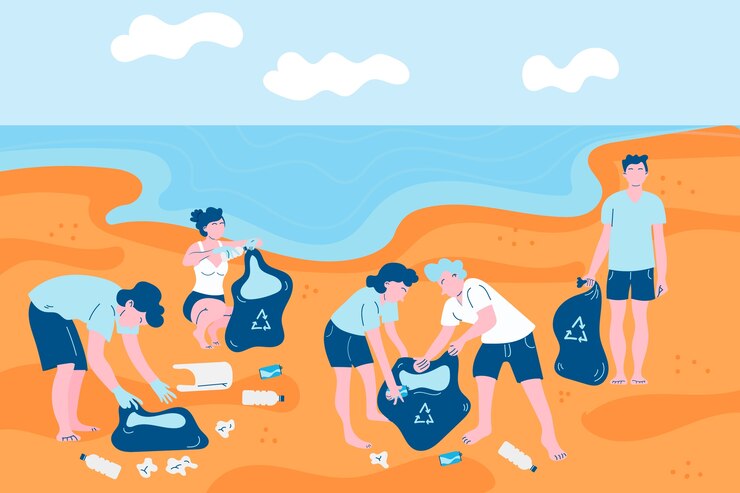
We’re dedicating our features this July to the world’s most stunning and distinctive beaches and islands. Now that many travelers are finally able to enjoy the beach vacations they’ve been dreaming of for over a year, there’s no better time to celebrate those breathtaking coastlines and tranquil waters that often star in our daydreams. Our features will introduce you to lesser-known beaches to consider for your next trip, share the story of a Spanish community that came together to protect its shoreline, unveil a little-known and exclusive Hawaiian island, and offer groundbreaking beach tips from the experts.
The Spanish island of Menorca, nestled in the Mediterranean Sea’s clear waters, has long prioritized protecting its coast over development like some of its neighbors. However, its beaches aren’t immune to litter. Summer crowds leave piles of trash on the sand, and plastic from Spain’s mainland often washes ashore. The local government works hard to keep the beaches clean, but doing so requires many hands. On an island paradise like this, the beach is a treasured resource.
To address these challenges, a local environmental organization introduced the idea of beach adoption. The Balearic Ornithological Group—or GOB, as it’s known in Catalan—invited groups of friends, classrooms, businesses, and even strangers to adopt sections of coastline, becoming fully responsible for their upkeep.
“The goal is to clean, certainly, but there’s already a public cleaning service,” explained Victor Carretero, a marine technician and project organizer with GOB. “Volunteers go through training, learning not just about cleaning, but also how to handle damaged signs, assist injured sea turtles, contact the right authorities when encountering invasive species or boats in protected waters, and more.”
Initially aiming for 100 volunteers to form 10 groups, the organizers were uncertain about reaching this target for the program’s launch in September 2020. To their surprise, the response was overwhelming. “On day one, our email system crashed from the sheer number of responses,” Carretero recalls. “Within a week, we had 800 volunteers, and two weeks later, we had 1,200. Today, we’ve exceeded 1,800, which is impressive given that this figure represents about two percent of Menorca’s population.”
One participating group is the Menorca-based jewelry company Vidal&Vidal. The CEO asked his employee Iñaki Cucarella to gather volunteers, resulting in over 90 percent of the staff joining in. “We’re all locals, so we’re focused on reusing, cleaning, and conserving natural resources to protect our environment,” Cucarella said.
Another initiative expanding local volunteer involvement beyond the shoreline is the local scuba company Binibeca Diving, which organizes seasonal trips dedicated to removing underwater debris, allowing residents and tourists alike to witness the impact of litter on marine life firsthand.
Starting their cleanup efforts, Cucarella and his team were shocked by visitors’ disregard for the beaches. They collected drink cans, glass bottles, plastic containers, and even used toilet paper. They were amazed by how much debris washed ashore from afar, including fishing nets, snorkeling equipment, tarps, and even car tires.
“Our biggest surprise,” Cucarella notes, “was realizing how much mesoplastics and microplastics were still present after days of cleaning.” Training includes learning to remove these microplastics, which are smaller than 25 millimeters and 5 millimeters, respectively. Often unnoticed by beachgoers, they require a colander to sift them out. “It’s disheartening to see that after over 250 hours dedicated to just one small area of beach, microplastics are still prevalent.”
Some beaches are easy to reach, but certain groups choose more secluded stretches of coastline. Local resident Mercedes Gomis, who grew up on the island, eagerly adopted a beach with friends and their children, selecting the remote cove Cala Escorxada. Despite the hour-and-15-minute hike required to get there, the spectacular view along the cliffs overlooking the Mediterranean makes the journey worthwhile.
Gomis has seen positive changes within her own family. Seeing the importance of teaching children to care for our planet, she notes, “My 7-year-old daughter now picks up plastic and garbage wherever we go—be it the beach, countryside, or city.”
Everyone involved agrees that keeping beaches clean is crucial, but adopting a beach has broader implications beyond litter removal. Volunteers emphasize that it’s about inspiring younger generations to work together. Cucarella remarked how seeing children’s involvement and early community activism has been one of the most rewarding aspects.
“We need to tackle the root of the problem,” Carretero said, explaining the project’s motto, “conèixer, estimar, cuidar,” which translates to understand, love, and take care of. “When people understand the beach, they grow to love it, and when they love it, they will ultimately take care of it.”


